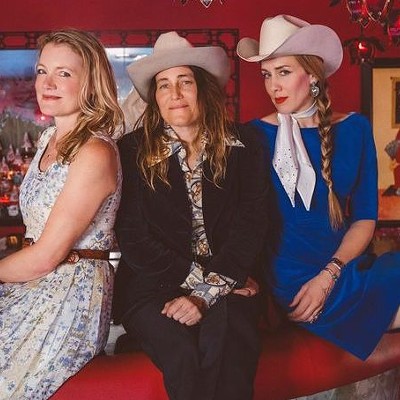Everyone should witness at least one live auction at least once in his or her lifetime. Even if you’re not even there to buy anything, there’s something bittersweet about watching bits of the past get sold to the highest bidder one lot at a time, but not while actual bidding is going on — it’s too exciting, and too easy to get caught up in it. The auctioneer maintains a steady stream of patter while a spotter scans the crowd for bids and yelps every time a card is raised. The tension rises until the bidding slows, at which point the “going once…going twice” warnings crescendo like the final stabs of a conductor’s baton at the end of a long symphony. It’s a little bit like sports; there’s only room to get sentimental after it’s over.
Last Friday afternoon, the auctioneer was the award-winning Wayne Wheat, who had come down from Bryan/College Station to Cypress to sell off the contents of Tin Hall, the historic dance hall and social-events center said to be the oldest building of its kind in Harris County, or at least it was until it closed when the lights came up on New Year’s Eve. Often enough, it was easy to lose track of what Wheat was actually selling in his light-speed cadences.
“He’s a state champion,” said Tin Hall’s owner, Mark Martinez, as Wheat whirred away in the background, selling barstools or vintage beer signs or something. “He's amazing. He's got a good character. He's done stuff all over the country; he does stuff outside the country, and he's got a good following of people who follow him to auctions. It was a no-brainer for us.”
As with many other Texas dance halls — so many there’s even a society for their preservation — the relentless march of time and suburbia finally caught up to Tin Hall, which originally opened as the Cypress Gun & Rifle Club in 1889. For generations, it was owned by a man named Fred Stockton, who sold it to Martinez in October of 2014. Today, suburban-style homes are visible from Tin Hall’s unpaved parking lot; soon there will be even more. When we spoke on Friday, Martinez wasn’t sure exactly how long the building had been used as a music venue — it sprang from the dances the Germans and Czechs who settled the area would throw at the Gun & Rifle Club, he said — but it had been long enough to host the likes of Ray Price and Merle Haggard in the ‘50s and ‘60s; Tracy Byrd, John Michael Montgomery, Pat Green and Tim McGraw in the ‘80s and ‘90s; and, although less frequently, other like-minded honky-tonk acts through the end of last year.
The auction drew a fair amount of coverage from the Houston media; lots of memories from old-timers and a few inevitable “end of an era”-type clichés, which is understandable enough. The modern era pushing aside small-town Texas culture in the name of progress, here in the form of one more high-end suburban subdivision, certainly fits into one of this state’s most compelling and enduring narratives. But all the romanticizing of Tin Hall's past glossed over an even greater point, and an even more interesting twist to its story.
See, Tin Hall isn’t really closing. It’s just moving, in five pieces, to a spot Martinez says is just a few miles away on Spring-Cypress Road — a smaller piece of property, shaded with oak trees, that he hopes will offer “higher visibility.” The auction was held so the move won’t cost any more than it already will, he explains.
“The cost to move this building is about $300,000,” Martinez says. “That’s the cost to move the building and [pour] the new foundation. If I was to go and build a new building, it would cost me $2.5 million to build. So for me to take the history that's here, and move the building for $300,000, it's worth it both financially and, you know, historically.”
Once the foundation at the new location is sunk, each piece of Tin Hall will be moved separately and set into its new place. When all the pieces have been moved, set and bound together, Martinez says, the only evidence of the move will lie in the seams in the wooden dance floor, “but over time with the dance wax, you won't even notice it.” The whole process could be complete by the end of May or beginning of June, he says.
“But as far as the barstools and all that stuff, I'd have to pack 'em up, inventory 'em, store 'em, move 'em and unpack ‘em,” Martinez notes. “So it's better for me to share a little piece of history with everybody than it is for me to keep all this stuff. Because it's not the neons and the furniture that make Tin Hall; it's the building, it's the name and it's the community.”
In 2005, new highway construction cut Tin Hall off from Huffmeister, one of the main roads through the Cypress area; the detour, Martinez says, “kind of hurt the business.” Martinez bought the building and associated intellectual property in October 2014, the same time the developer bought the land; that kind of transaction is known as a “simultaneous close.” His lease was originally for two years, but when the economy began to falter, Martinez says, the developer decided to move up the timetable. By moving Tin Hall rather than let it become one more bygone Texas dance hall, Martinez is betting a piece of Texas’s historic past still has a place in the present. His goal in relocating the building, he says, is for couples and families in the Cypress area to be dancing at Tin Hall for generations to come.
“When you're doing third- and fourth-generation weddings, it means a lot,” Martinez says. “You’ve got people who drive in from College Station and from Austin and from Dallas to have their wedding here because their grandmother lived back here, or their mother got married here. It means a lot.”
Support Us
Houston's independent source of
local news and culture
account
- Welcome,
Insider - Login
- My Account
- My Newsletters
- Contribute
- Contact Us
- Sign out
[
{
"name": "Related Stories / Support Us Combo",
"component": "11591218",
"insertPoint": "4",
"requiredCountToDisplay": "4"
},{
"name": "Air - Billboard - Inline Content",
"component": "11591214",
"insertPoint": "2/3",
"requiredCountToDisplay": "7"
},{
"name": "R1 - Beta - Mobile Only",
"component": "12287027",
"insertPoint": "8",
"requiredCountToDisplay": "8"
},{
"name": "Air - MediumRectangle - Inline Content - Mobile Display Size 2",
"component": "11591215",
"insertPoint": "12",
"requiredCountToDisplay": "12"
},{
"name": "Air - MediumRectangle - Inline Content - Mobile Display Size 2",
"component": "11591215",
"insertPoint": "4th",
"startingPoint": "16",
"requiredCountToDisplay": "12"
}
,{
"name": "RevContent - In Article",
"component": "12527128",
"insertPoint": "3/5",
"requiredCountToDisplay": "5"
}
]
KEEP THE HOUSTON PRESS FREE...
Since we started the Houston Press, it has been defined as the free, independent voice of Houston, and we'd like to keep it that way. With local media under siege, it's more important than ever for us to rally support behind funding our local journalism. You can help by participating in our "I Support" program, allowing us to keep offering readers access to our incisive coverage of local news, food and culture with no paywalls.
Chris Gray has been Music Editor for the Houston Press since 2008. He is the proud father of a Beatles-loving toddler named Oliver.
Contact:
Chris Gray
Trending Music
- Houston Concert Watch 4/24: Rolling Stones, Bad Bunny and More
- How Much Longer Can Classic Rock Rule the Roost?
- Top 10 Butt-Rock Bands of All Time
-
Sponsored Content From: [%sponsoredBy%]
[%title%]

Don't Miss Out
SIGN UP for the latest
Music
news, free stuff and more!
Become a member to support the independent voice of Houston
and help keep the future of the Houston Press FREE
Use of this website constitutes acceptance of our
terms of use,
our cookies policy, and our
privacy policy
The Houston Press may earn a portion of sales from products & services purchased through links on our site from our
affiliate partners.
©2024
Houston Press, LP. All rights reserved.





